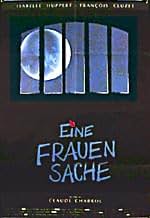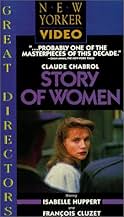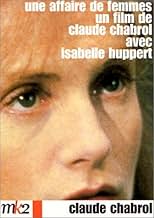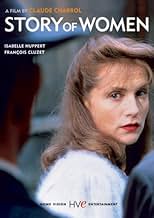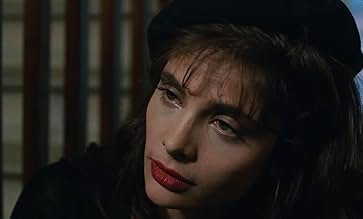IMDb-BEWERTUNG
7,5/10
6164
IHRE BEWERTUNG
Eine Hausfrau im nationalsozialistisch besetzten Frankreich kämpft um ihren Lebensunterhalt, als ihr Mann nach einer Kriegsverletzung nach Hause zurückkehrt.Eine Hausfrau im nationalsozialistisch besetzten Frankreich kämpft um ihren Lebensunterhalt, als ihr Mann nach einer Kriegsverletzung nach Hause zurückkehrt.Eine Hausfrau im nationalsozialistisch besetzten Frankreich kämpft um ihren Lebensunterhalt, als ihr Mann nach einer Kriegsverletzung nach Hause zurückkehrt.
- Auszeichnungen
- 14 Gewinne & 8 Nominierungen insgesamt
Empfohlene Bewertungen
This earns a high rating simply for the gritty, persuasive performance from it's star, Isabelle Huppert, who is called upon to be a mother and an abortionist, to be a lover and a murderer, to be a free spirit and a prisoner of Nazi tyranny; Huppert may never gain your sympathy, and doesn't play for it, but she should gain your understanding as she plays a true-to-life story of a woman severely punished by the French government for a woman's crime that the dominant culture can not countenance because of the political atmosphere at the time--all this, and it's a gripping story,too--but not at all a cheerer-upper.
When you have finished watching this film, you may find Huppert's character hasn't quite finished with you, an observant, quiet reminder of the consequences of our actions. Hers is a haunting performance.
When you have finished watching this film, you may find Huppert's character hasn't quite finished with you, an observant, quiet reminder of the consequences of our actions. Hers is a haunting performance.
Definitely one of director Claude Chabrol's best films, if not his best.
It is based upon a true story out of Nazi occupied France, and stars the incredible Isabelle Huppert (The Piano Teacher, 8 Women). She is supported by Marie Trintignant (Harrison's Flowers), who had her career cut short by an untimely death.
Huppert finds a way to feed her family. She performs abortions and rents out rooms to prostitutes. Everything seems to be going well for her, but her husband is not happy about the fact that he hasn't had any in 10 years, and she now has a lover - he turns her in.
France is now rid of the Germans and is trying to restore her morality. Unfortunately, Marie to be made an example.
Huppert was great, and Trintigant was also very good.
It is based upon a true story out of Nazi occupied France, and stars the incredible Isabelle Huppert (The Piano Teacher, 8 Women). She is supported by Marie Trintignant (Harrison's Flowers), who had her career cut short by an untimely death.
Huppert finds a way to feed her family. She performs abortions and rents out rooms to prostitutes. Everything seems to be going well for her, but her husband is not happy about the fact that he hasn't had any in 10 years, and she now has a lover - he turns her in.
France is now rid of the Germans and is trying to restore her morality. Unfortunately, Marie to be made an example.
Huppert was great, and Trintigant was also very good.
'Une affaire de femmes' (the English distribution title was 'Story of Women'), Claude Chabrol's 1988 film gives Isabelle Huppert the opportunity to create one of the most memorable roles of a formidable career. Chabrol, the director about whom Huppert would posthumously say that he filmed her like a father, sets his drama in the period of World War II and the occupation, bringing to screen the biography of the last woman to be sentenced to death and executed in the history of France. The charge was the practice of illegal abortions, and the exemplary punishment was a consequence of the moral and national decay of the Vichy collaborationist regime. The pro-life vs. Pro-choice are still current in many countries of the world today (not in France), but that is not the main theme of the film. In fact, Chabrol avoids any moral judgment on one side or the other of this dispute. His target is - as in many of his other films - the French bourgeoisie during the war, in one of the most abysmal periods of its history, a period marked by collaboration, corruption, immorality and hypocrisy.
The story takes place in the months and the first years after the defeat of France, the occupation of part of the country's territory and the installation in Vichy of a collaborationist government under the leadership of Marshal Petain. Marie is one of many young women left behind alone with two children to care for after her husband leaves for war. She is a simple woman living in a provincial town whose dreams of becoming a singer or even of leading a normal life have been dashed by the war. Somewhat by chance, while helping a neighbor friend, she discovers her ability to perform abortions. The return of her husband does not improve the family situation, on the contrary. Paul, traumatized by the war, becomes an extra burden, and any spark of love that may have existed between the two is now extinguished. Marie decides to turn her talent for helping other women into a source of income. There is no shortage of opportunities. Many women left alone are forced to look for support among occupiers or collaborators, and the children resulting from these relationships are unwanted burdens and risk compromising the mothers morally and socially. Marie's business prospers, the woman begins enjoy her better life, she also takes a lover, while asking herself few questions about what she is doing. However, the jealous husband does not accept the situation.
Isabelle Huppert is perfect in such roles, where facts are ambiguous and feelings repressed. Neither the screenwriters nor the director insist on making any moral judgment about the woman's actions. When she is caught, tried and condemned by a system that wants to make her a punishable example of immorality, the filmmakers' compassion seems to shift more towards the children left behind and destined to remain motherless. Huppert's Marie combines innocence with carelessness, love for children with a desire to live her life at all costs. It's a complex and interesting character, one of the best roles of his career. François Cluzet is her acting partner as the husband whose deeds as a sort of catalyst for the woman's downfall. As for Chabrol, during this period he had filtered and decanted all the lessons of New Wave cinema and had reached a remarkable efficiency and acuity of his means of expression - both in writing the story (inspired by a book by Francis Szpiner - jurist and politician, nowadays mayor of a Parisian arrondissement) but also in working with the camera. With restraint and without pathos, 'Une affaire de femmes' is one of the harshest cinematic indictments of French collaborationism and a statement of compassion for its victims.
The story takes place in the months and the first years after the defeat of France, the occupation of part of the country's territory and the installation in Vichy of a collaborationist government under the leadership of Marshal Petain. Marie is one of many young women left behind alone with two children to care for after her husband leaves for war. She is a simple woman living in a provincial town whose dreams of becoming a singer or even of leading a normal life have been dashed by the war. Somewhat by chance, while helping a neighbor friend, she discovers her ability to perform abortions. The return of her husband does not improve the family situation, on the contrary. Paul, traumatized by the war, becomes an extra burden, and any spark of love that may have existed between the two is now extinguished. Marie decides to turn her talent for helping other women into a source of income. There is no shortage of opportunities. Many women left alone are forced to look for support among occupiers or collaborators, and the children resulting from these relationships are unwanted burdens and risk compromising the mothers morally and socially. Marie's business prospers, the woman begins enjoy her better life, she also takes a lover, while asking herself few questions about what she is doing. However, the jealous husband does not accept the situation.
Isabelle Huppert is perfect in such roles, where facts are ambiguous and feelings repressed. Neither the screenwriters nor the director insist on making any moral judgment about the woman's actions. When she is caught, tried and condemned by a system that wants to make her a punishable example of immorality, the filmmakers' compassion seems to shift more towards the children left behind and destined to remain motherless. Huppert's Marie combines innocence with carelessness, love for children with a desire to live her life at all costs. It's a complex and interesting character, one of the best roles of his career. François Cluzet is her acting partner as the husband whose deeds as a sort of catalyst for the woman's downfall. As for Chabrol, during this period he had filtered and decanted all the lessons of New Wave cinema and had reached a remarkable efficiency and acuity of his means of expression - both in writing the story (inspired by a book by Francis Szpiner - jurist and politician, nowadays mayor of a Parisian arrondissement) but also in working with the camera. With restraint and without pathos, 'Une affaire de femmes' is one of the harshest cinematic indictments of French collaborationism and a statement of compassion for its victims.
I'd like to focus on this film as a French film, not of the United States. If one has seen "La Chagrin et la Pitie," then one knows the legacy of this film. France was not perfect during WWII. Not everyone in France was part of the resistance, mainly, they were trying to survive. I think its an amazing film that sheds light on a crucial point in French history. Yes, it's about abortion and Chabrol does a great job ensuring his abortionist is less than perfect. That's a wonderful point he makes, that no one is perfect, not even the moral majority of the government. But, I come away from this film with the same questions that I get from "Lacombe, Lucien," which are: 'what would I have done?' And, please, don't Monday morning quarterback World War II.
Isabelle Huppert portrays an uneducated but self-reliant wartime mother of two, who almost ruthlessly assumes the traditional male role of family breadwinner by helping (to use an old euphemism) young girls 'in trouble'. The film isn't exactly impartial in its attitude toward the opposite sex, but don't me misled by the somewhat presumptuous title: it isn't strictly a story for women, and despite the vocation of its heroine has little to say about the volatile issue of abortion. The focus is more on the plight of women as second-class citizens, forced by necessity to fend for themselves (and rely on each other) while their men are away playing soldiers. It tells a complex story very simply, avoiding any soapbox grandstanding but allowing Huppert a chance to invest her character with plenty of gender-specific spleen. The final impact is undeniable: it's an often powerful experience, likely to stir up plenty of talk and emotion.
Wusstest du schon
- WissenswertesBased upon the true story of Marie-Louise Giraud, with character names changed.
- SoundtracksLe Poème de l'Amour et de la Mer
Written by Ernest Chausson
Top-Auswahl
Melde dich zum Bewerten an und greife auf die Watchlist für personalisierte Empfehlungen zu.
- How long is Story of Women?Powered by Alexa
Details
- Erscheinungsdatum
- Herkunftsland
- Offizieller Standort
- Sprachen
- Auch bekannt als
- Story of Women
- Drehorte
- Coulommiers, Seine-et-Marne, Frankreich(interiors: women's prison)
- Produktionsfirmen
- Weitere beteiligte Unternehmen bei IMDbPro anzeigen
Box Office
- Bruttoertrag in den USA und Kanada
- 438.483 $
- Laufzeit1 Stunde 48 Minuten
- Sound-Mix
- Seitenverhältnis
- 1.66 : 1
Zu dieser Seite beitragen
Bearbeitung vorschlagen oder fehlenden Inhalt hinzufügen



